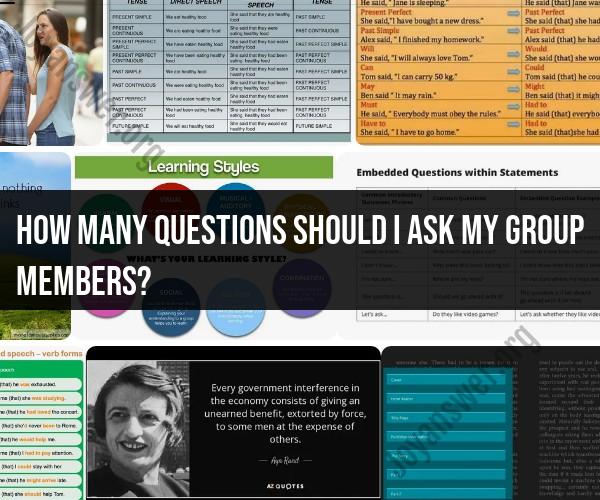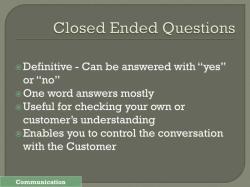How many questions should I Ask my group members?
The number of questions you should ask your group members can vary depending on the context, purpose, and dynamics of the group. There is no specific or fixed number of questions that applies universally, as effective group communication is more about quality than quantity. However, here are some considerations to help you determine how many questions to ask:
Purpose of the Communication: Consider the purpose of the communication. Are you facilitating a brainstorming session, seeking input on a specific topic, making decisions, or conducting a casual discussion? The purpose will influence the number of questions needed.
Complexity of the Topic: If the topic or issue being discussed is complex or multifaceted, it may require more questions to explore thoroughly. Complex issues often benefit from multiple questions that delve into different aspects.
Engagement and Participation: Pay attention to the level of engagement and participation within the group. If you sense that some members are not actively contributing, you may need to ask more questions to involve them and gather their perspectives.
Balance and Fairness: Strive for a balance in communication. Avoid monopolizing the conversation with too many questions. Ensure that other group members have the opportunity to ask questions and express their thoughts.
Clarity and Conciseness: Frame questions that are clear and concise. Avoid asking redundant or vague questions, as they can lead to confusion and inefficiency.
Listening and Feedback: Encourage active listening within the group. After asking a question, allow sufficient time for members to respond and provide feedback when necessary.
Prioritize Key Questions: Identify key questions that are essential for achieving the group's goals. Focus on these questions and use them as a framework for discussion. Additional questions can be supplementary.
Group Size: The size of the group matters. In larger groups, it may be challenging to ask too many questions or allow every member to respond to each question. In such cases, you may need to prioritize questions more selectively.
Time Constraints: Consider time constraints. If you have limited time for the discussion, you may need to be more selective in the questions you ask.
Facilitation Skills: If you are the facilitator or leader of the group, your facilitation skills play a role. Effective facilitation involves not only asking questions but also managing the flow of the discussion and keeping it on track.
In summary, the number of questions you should ask your group members depends on the specific circumstances. The key is to strike a balance, maintain a clear focus on the group's objectives, and ensure that communication is inclusive and effective. It's also essential to be adaptable and responsive to the dynamics and needs of the group as the discussion progresses.
Asking Questions in Group Settings: A Guide
Asking questions in group settings is an important skill for both learning and contributing. Effective questioning can help you to:
- Gather information and clarify understanding
- Challenge assumptions and generate new ideas
- Promote discussion and engagement
- Build relationships and trust
The Importance of Questions in Group Interactions
Questions play a vital role in group interactions. They can help to:
- Start and maintain conversations: Asking open-ended questions can help to get the conversation started and keep it flowing.
- Encourage participation: Asking questions can help to draw out all group members and encourage them to participate in the discussion.
- Clarify understanding: Asking questions can help to ensure that everyone understands the topic at hand and that there are no misunderstandings.
- Generate new ideas: Asking thought-provoking questions can help to challenge assumptions and generate new ideas.
- Solve problems: Asking questions can help to identify problems, explore possible solutions, and make decisions.
Strategies for Effective Questioning in Group Discussions
Here are some strategies for effective questioning in group discussions:
- Ask open-ended questions: Open-ended questions require more than a yes or no answer and encourage discussion. For example, instead of asking "Do you like this idea?", you could ask "What do you think of this idea? What are the pros and cons?"
- Be specific: Avoid asking vague or general questions. Instead, ask specific questions that focus on a particular aspect of the topic. For example, instead of asking "What do you think of the new product?", you could ask "What do you think of the new product's features? What do you think of the price?"
- Be respectful: Be respectful of all group members and their opinions. Avoid asking questions that are accusatory or judgmental.
- Be active: Listen carefully to the answers to your questions and follow up with additional questions as needed.
Balancing Quantity and Quality of Questions
It is important to balance the quantity and quality of your questions. Asking too many questions can be disruptive and annoying to other group members. However, asking too few questions can make you seem uninvolved or uninterested.
A good rule of thumb is to ask one or two questions per topic. If you have more questions, try to save them for later or ask them privately.
Encouraging Participation and Engagement with Questions
Here are some tips for encouraging participation and engagement with questions:
- Direct your questions to specific group members: This can help to draw out people who are less likely to participate on their own.
- Ask follow-up questions: This shows that you are interested in what the person has to say and that you are listening carefully.
- Summarize and repeat questions: This can help to ensure that everyone understands the question and that there are no misunderstandings.
- Allow enough time for people to answer: Don't rush people to answer your questions. Give them enough time to think about their answer and to formulate a response.
By following these tips, you can ask questions in group settings that are effective, respectful, and engaging.












